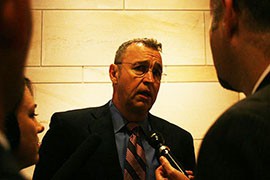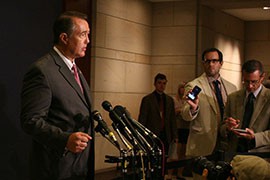Cronkite News has moved to a new home at cronkitenews.azpbs.org. Use this site to search archives from 2011 to May 2015. You can search the new site for current stories.
Arizona lawmakers want greater say in U.S. strategy against ISIS
WASHINGTON – Arizona’s congressional delegation may disagree over exactly what the U.S. strategy toward ISIS should look like, but in a rare moment of bipartisan unity, members said Congress should have more input into the decision making.
The plan laid out by President Barack Obama should be brought to Congress so it can “be thoroughly vetted by the American people,” said Rep. Matt Salmon, R-Mesa, adding that the president “should come clean with the American people.”
“If he wants a declaration of war, then he needs to go to Congress,” Salmon said after a Thursday briefing of House members by the president’s national security team.
In a prime-time speech Wednesday, Obama did not declare war against ISIS – the Islamic State of Iraq and Syria, a militant Islamist army that has taken control of large areas of those countries. He instead laid out a plan for airstrikes, military training and arming the Syrian opposition in a campaign to “degrade and ultimately destroy” ISIS.
Few voices against action were heard on Capitol Hill Thursday, but many lawmakers questioned whether the president’s plan goes far enough.
Sen. John McCain, R-Ariz., in a joint statement Wednesday evening with Sen. Lindsey Graham, R-S.C., said the president “described the correct goal – to degrade and ultimately destroy ISIS” and that the proposals “deserve bipartisan support.” But while the plan could degrade ISIS, they said, it “will likely be insufficient to destroy” the terrorist group.
Rep. Trent Franks, R-Glendale, said he believes Congress will ultimately support Obama’s request but, like McCain, he believes the president’s strategy is “insufficient.”
“The speech … outlined some important things and I think Congress will respond accordingly,” Franks said. “But it is too bad that when we face an enemy this dangerous, that the speech included things that we would not do. America should respond proactively.”
While the president said he has the legal authority to conduct broad military operations in the region, he asked Congress for explicit authorization for U.S. military personnel to train Syrian, Iraqi and other forces to carry the fight to ISIS.
“I still am very, very perplexed as to why the president is asking us to give him the authority to train the Syrian Free Army … but yet he’s not asking for any language regarding the bombing and the airstrikes,” Salmon said.
He said he is offended by Obama’s oft-repeated promise that he will not “put boots on the ground,” noting that the president said he is deploying more than 450 troops to the region.
“I think it … demeans what they’re doing to say that there are not going to be boots on the ground,” Salmon said of those troops.
“I don’t know if they’re going to be wearing tennis shoes or flip-flops or something else, but the fact is there will be boots on the ground … and they will be in harm’s way,” he said.
Other members sounded a cautionary note, and expressed concern about participating “in a three-way civil war.”
“We’ve learned the danger’s in the details,” said Rep. David Schweikert, R-Fountain Hills. “We need to make sure we get this right.”
Rep. Raul Grijalva, D-Tucson, said the use of U.S. military force means Congress should weigh in so that the “voices of the American people can be heard during a full and robust debate.”
House Speaker John Boehner “should put legislation authorizing military action on the floor of the House,” Grijalva said in a joint statement with members of the Congressional Progressive Caucus.
Rep. Ron Barber, D-Tucson, said the president probably has the authority he needs to combat the “savagery” of ISIS, whose fighters have beheaded journalists and have been accused of killing innocents. But, he said, Congress must still be involved.
“We need a unified government working together,” Barber said. “The enemy needs to know that we’re united.”








